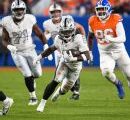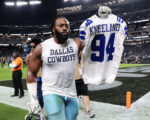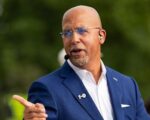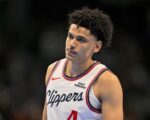FLORHAM PARK, N.J. — In his first personnel move as the New York Jets’ coach, Aaron Glenn fired quarterback Aaron Rodgers. In his latest quarterback decision, Glenn benched Rodgers’ replacement Justin Fields, signaling the most likely end to the organization’s $30 million gambit after 10 games.
An NFL coach doesn’t have endless mulligans, but Glenn will be afforded another swing to solve the riddle that has confounded the franchise since Joe Namath played his last game 50 years ago.
The next one is the big one. It will likely be a high draft pick (in 2026 or 2027) or perhaps a trade for a veteran.
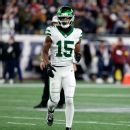
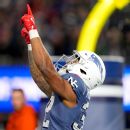
1 Related
What happened Monday — Glenn informed the team that Fields will be replaced by Tyrod Taylor — confirms that the Jets (2-8) will have two lame-duck quarterbacks for the remainder of the season. It felt inevitable. Heck, Glenn almost made the switch four weeks ago after pulling Fields in a dreadful loss to the Carolina Panthers.
While New York will prepare for its final seven games, the long-term focus shifts to the offseason — when the Jets are expected to reset their quarterback depth chart. Fields is under contract for 2026 ($20 million salary, half of which is guaranteed), but it’s hard to imagine him as part of the plan. Taylor, 36, will be a free agent.
So there’s a good chance the Jets will start over, with a veteran and a rookie. They have a surplus of first-round draft picks, thanks to the recent Sauce Gardner and Quinnen Williams trades — two in 2026, three in 2027.
First, this question must be asked: Can the people who got it so wrong with Fields get it right with the next one?
Glenn and general manager Darren Mougey will be charged with the big decision, just as Joe Douglas was in 2021 (Zach Wilson) and Mike Maccagnan was in 2018 (Sam Darnold).
Neither quarterback worked out. The Jets have a history of that. Glenn and Mougey will have a chance to change the trajectory of the franchise, which has suffered through 14 straight non-playoff seasons, in large part because of quarterback instability.
Best, worst of Week 11: Eagles, Chiefs, more
• How Miami’s Jones called game in Madrid
• How Vrabel has Patriots pushing to playoffs
• Jets believe in Adonai Mitchell’s potential
At the time, their thinking on Fields probably went like this: With seasoning and sound coaching, he can outperform his spotty NFL track record and push his way into long-term conversation. Sure, it was a game of chance, like hoping to find a winning lottery ticket, but they liked the risk-reward ratio.
«What were their options?» a longtime personnel executive said. «Rodgers didn’t make sense, and Fields, was the arrow still pointing up? I think so, so I’m not going to beat them up for it.»
Before the season, Mougey believed that Fields could be the next Baker Mayfield or Sam Darnold — late-developing former high picks.
«I do believe Justin can be one of those guys,» Mougey said.
Nevertheless, here we are.
Pairing Fields with Tanner Engstrand, an inexperienced offensive coordinator from a drop-back system, hasn’t worked out. Fields failing as the Jets’ starter isn’t blockbuster news (since 2021, he’s 33rd out of 38 qualified passers in Total QBR); that he failed so spectacularly is what should raise concern.
Dante Moore (Oregon), Fernando Mendoza (Indiana), Ty Simpson (Alabama) and LaNorris Sellers (South Carolina) are ranked first, second, fifth and 21st, respectively, on ESPN senior draft analyst Mel Kiper Jr.’s latest Big Board. They’re all underclassmen, and there’s a feeling that Moore and Simpson could return to school for more seasoning.
Mougey has scouted Mendoza and Moore in person this fall. He witnessed Mendoza’s dramatic, game-winning drive against Penn State. The Jets hold the fifth pick in the draft, but they have the draft capital to trade up if they’re smitten with one of the top prospects.
2026 free agency. Two words — slim pickings. The only starter eligible for free agency is Daniel Jones, who likely will be retained by the Indianapolis Colts. The rest are likely backup types; you’d be hard-pressed to find even a bridge starter among the group.
Full schedule » | Standings »
• Depth charts for every team »
• Transactions » | Injuries »
• Football Power Index »
More NFL coverage »
2026 trade market. Kyler Murray, Kirk Cousins and Mac Jones are the names to watch. Joe Burrow has been discussed on talk shows and such, but that seems like a pipe dream. Jones, who has resurrected his career in Kyle Shanahan’s quarterback-friendly offense, is the most intriguing option. As Brock Purdy’s injury replacement, Jones is 5-3 with the San Francisco 49ers. Maybe he’d fit for one or two years, allowing the Jets to wait until 2027 to draft their long-term solution.
In that sense, Jones would be like Fields. Jones would also be the third Jets quarterback from the 2021 first round, joining Wilson and Fields.
Cousins, who has replaced injured Atlanta Falcons starter Michael Penix Jr., will have an opportunity to improve his value. In 2018, the Jets made an unsuccessful free agent bid for Cousins, which might have chafed some feelings in the organization.
Right now, the Jets are in quarterback hell. They’ve been frequent visitors to this place. Maybe they should’ve drafted one in the second or third round last spring, creating some hope. Maybe they should’ve taken Jaxson Dart in the first round. They opted to go all-in with Fields.
If the Jets cut Fields after the season, they will have to absorb $22 million in dead cap charges. They’re still paying off their debt from the ill-fated Rodgers mistake — $35 million in dead cap for 2026. That would be $57 million for absent quarterbacks.
No matter what, the Jets are headed for a total rebuild at quarterback.


